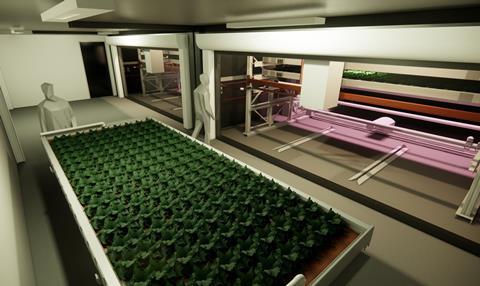Agri-group repurposes building for its first vertical farm in Germany
Potager Farm has announced that it has secured €3m in funding and appointed a contractor to construct its first vertical farm in eastern Berlin.

According to the agricultural company, a joint venture between the Greenman Group of companies and the fund Greenman Open, the vertical farm will be funded 25 per cent by the Greenman Group and 75 per cent by its fund Greenman Open.
Comprising three 6m-high controlled atmosphere towers with a total cultivation area of approximately 650m2, the vertical farm will be installed by the general contractor Plattenhardt + Wirth in partnership with Intelligent Growth Solutions (IGS) in one of the Greenman Open fund’s properties in the Berlin district of Marzahn-Hellersdorf.
Potager Farm is responsible for the concept design, planning and operation of the installation that will be completed in the third quarter of 2023, growing fresh produce to supply retail centres, supermarkets, retailers, restaurants, and hotels.
The farm uses IGS’s technology to grow crops in vertically stacked layers within an enclosed building where all environmental conditions such as light, heat, humidity and nutrients can be automatically controlled to maintain optimal growing conditions and conserve natural resources.
Its irrigation tanks will use water caught by its rainwater catchment system and Greenman Energy, a sister company of the Greenman Group, will install photovoltaic panels on the roof of the building to supply the farm with renewably generated solar power.
“Upcycling and repurposing this industrial building is not only a great opportunity to build an efficient, future-proof and financially sustainable vertical farming hub, but also demonstrates our commitment to Greenman’s sustainability strategy, which follows a “convert not demolish” approach to our assets,” said Andonis Sarmias, head of facility and construction project manager at Potager Farm.
”The choice of the location, in close proximity to the Biesdorf Center retail park, is also a perfect example of how regional and sustainable food production can be brought into the urban environment and of how food can be produced within a radius of less than a kilometre from the supermarket.”



